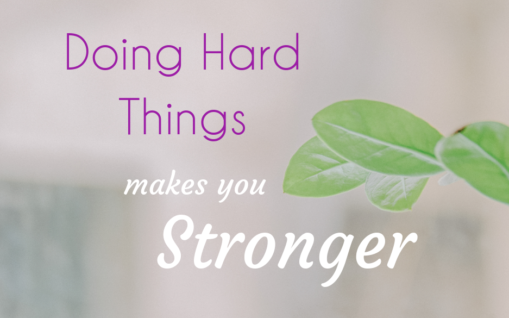
“He who deliberates fully before taking a step will spend his entire life on one leg.” Chinese Proverb
What’s one hard thing you need to start to
do right now to make your life better?
Does that voice in your head start to say–
…..I can’t do it.
- What if it goes awful?
- What if they get upset?
- What if I fail?
- What if I embarrass myself?
- What if it never works?
- What if I’m not good enough?
- What if it’s a total waste of time?
Our mind continues to build that list of worries in our minds.
Pretty soon, we’ve talked ourselves out of doing whatever it is that would make our lives easier.
We all have fears and worries and they never really go away.
When I first started writing a newsletter and blog, I would ask all those questions.
Especially in the beginning.
I pushed myself to do it anyway despite all the uncomfortable feelings I had about it.
It’s true that doing hard things makes you stronger.
That’s the way you grow.
You push through that uncomfortable feeling.
It took a long time for that feeling of dread and fear to subside.
It’s still there but not near as intense as it used to be.
I have made progress and part of that is due to the people who would send me comments and say that some information I put out there really helped them.
That motivated me to keep going.
EVER JUMPED OFF THE HIGH DIVING BOARD?
When I was a kid in swimming lessons and we had to jump off the high diving board, I was so SCARED!
In fact, I chickened out last minute and squeezed by everyone in line to HASTILY get back down that ladder.
I COULDN’T do it.
I was too SCARED.
Eventually I made myself feel the fear and do it anyway (probably because I was too embarrassed when everyone else was doing it)
Then I actually learned to LOVE jumping off the high diving board.
IMAGINE THAT!
Not only did I become comfortable with it, but I actually ENJOYED it!
When we do the thing we fear the most, the action of doing it is what CURES our fear.
Is there some area of your life where you need to move beyond your fear and just do it? (Nike really has a good slogan)
There are still other areas of my life where I need to embrace this concept.
I’m a work in progress.
But since I’ve succeeded in some areas of my life, I know that it’s possible to move beyond that uncomfortable feeling in other areas.
Mel Robbins, author of, “The Five Second Rule” says-when you think of the thing you need to do-immediately say 5-4-3-2-1 and then DO IT.
If you think too much, you’ll talk yourself right out of it.
You’ll let fear, uncertainty, and that uncomfortable feeling rule your life.
Here are four tips to help you REIGN in the uncomfortable feeling and DO IT anyway!
#1 AWARENESS-
The first step is always being mindful and aware of what’s going on inside of you.
…..What are you afraid of?
…..What’s behind your fear?
For me, (putting my information out there) is a fear of not being good enough, sounding stupid, looking stupid-being criticized.
In other words, I have some self-doubt about my ability and I want to be certain that it’s going to give value to people.
We can’t always have the certainty that we think we need. Sometimes we just have to 5-4-3-2-1 and DO IT!
#2 Be Honest
In what areas of your life are you letting that uncomfortable feeling hold you back?
You may be doing great moving forward in some areas of your life, but be honest-what are some things you could be doing that you aren’t because of fear or that vulnerable feeling?
I do speaking and I honestly admit that I let uncomfortable feelings hold me back from calling to introduce myself to people who may benefit from my speaking programs.
Although I’ve grown in many areas, there are still areas that I let fear, doubt, and insecurity hold me back.
What areas in your life are you letting
those feelings hold you back?
………Something at work you could be doing?
……….A conversation you’re avoiding?
……….Something you need to do to reach a goal?
Be honest, what could you be doing that you’re allowing your feelings to paralyze you from doing?
#3 Accept it
…..Notice It
…..Admit It
…..Accept It.
Everyone experiences those vulnerable, uncomfortable feelings that hold them back from doing something.
It’s completely normal so don’t fight it, allow yourself to notice it, admit it and accept it.
Something might be easy for someone and really scary or uncomfortable for someone else.
Everyone has an area of their life in which feelings of vulnerability are holding them back.
#4 Feel the fear and do it anyway.
…..Go have that conversation.
…..Go make that phone call.
…..Go apologize to someone.
…..Go apply for that job.
…..Go ask for that raise.
…..Go talk to your boss.
…..Go talk to that client.
…..Go talk to your spouse.
…..Go tackle that project.
…..Go ask for what you need.
Feel the fear and do it anyway.
It probably won’t be near as bad as you think it will.
5-4-3-2-1 DO IT (As Mel Robbins would say)
Don’t think too much!
Let go of any time you’ve failed in the past-
…..A failed conversation
…..A failed relationship
…..A failed attempt at doing something
And put yourself out there.
This quote from Marianne Williamson has always been one of my favorites.
“Our deepest fear is not that we are inadequate. Our deepest fear is that we are powerful beyond measure. It is our light, not our darkness that most frightens us. Your playing small does not serve the world. There is nothing enlightened about shrinking so that other people won’t feel insecure around you. We are all meant to shine, as children do….And as we let our own light shine, we unconsciously give other people permission to do the same. As we are liberated from our own fear, our presence automatically liberates others.”



 How often do you find yourself saying you can’t do something?
How often do you find yourself saying you can’t do something?
